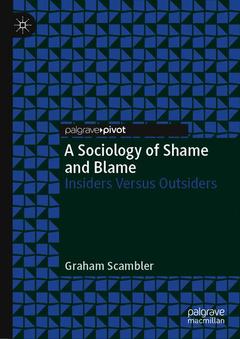A Sociology of Shame and Blame, 1st ed. 2020 Insiders Versus Outsiders
Auteur : Scambler Graham

This book presents a novel approach to framing the concept of stigma, and understanding why and how it functions.
Graham Scambler extends his analysis beyond common social interactionist understandings of stigma by linking experiences to the larger social structure?the political economy. A Sociology of Shame and Blame contends that stigma is being ?weaponised? as part of a calculated political strategy favouring capital accumulation over justice, and addresses how the shame associated with stigma has taken on the additional dimension of blame through micro-interactions.
The unique Insider-Outsider approach that Scambler harnesses draws on micro and macro social theory to identify links between the prevalence of stigma and agency, culture and structure, and will be an original and key reference point for students and scholars across the social and behavioural sciences, including, but not limited to, sociology, anthropology, psychology, public health and social policy.
Graham Scambler is Emeritus Professor of Sociology at UCL, and Visiting Professor of Sociology at Surrey University, UK.
Date de parution : 07-2019
Ouvrage de 118 p.
14.8x21 cm
Thèmes d’A Sociology of Shame and Blame :
Mots-clés :
Stigma; post-Goffman; stigmatisation; agency; culture; structure; migration; disability; homeless; sex workers; critical theory; Habermas
